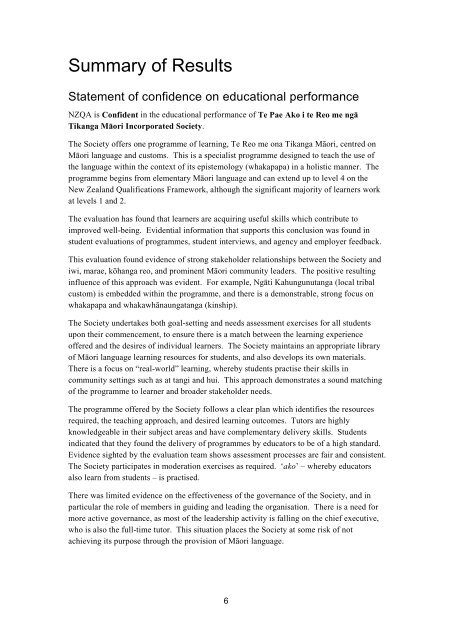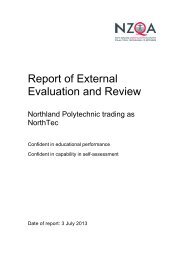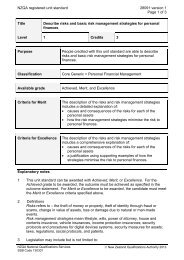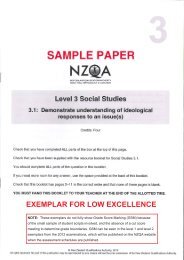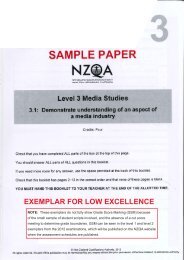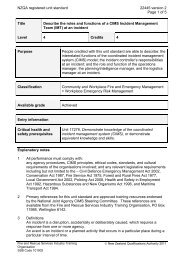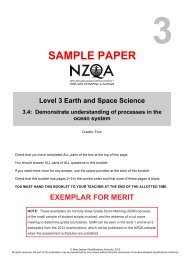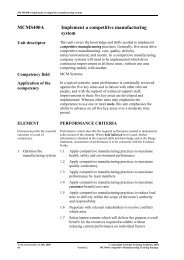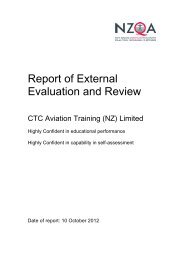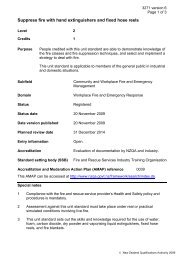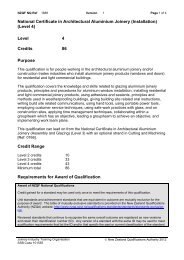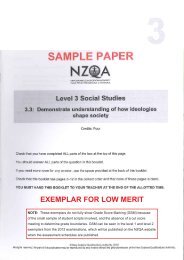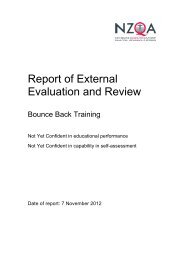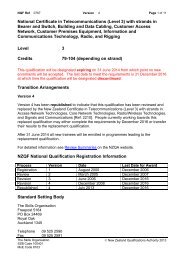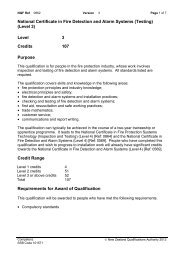Te Pae Ako i te Reo me nga Tikanga Maori Incorporated ... - NZQA
Te Pae Ako i te Reo me nga Tikanga Maori Incorporated ... - NZQA
Te Pae Ako i te Reo me nga Tikanga Maori Incorporated ... - NZQA
Create successful ePaper yourself
Turn your PDF publications into a flip-book with our unique Google optimized e-Paper software.
Summary of Results<br />
Sta<strong>te</strong><strong>me</strong>nt of confidence on educational performance<br />
<strong>NZQA</strong> is Confident in the educational performance of <strong>Te</strong> <strong>Pae</strong> <strong>Ako</strong> i <strong>te</strong> <strong>Reo</strong> <strong>me</strong> ngā<br />
Tika<strong>nga</strong> Māori Incorpora<strong>te</strong>d Society.<br />
The Society offers one program<strong>me</strong> of learning, <strong>Te</strong> <strong>Reo</strong> <strong>me</strong> ona Tika<strong>nga</strong> Māori, centred on<br />
Māori language and customs. This is a specialist program<strong>me</strong> designed to <strong>te</strong>ach the use of<br />
the language within the con<strong>te</strong>xt of its epis<strong>te</strong>mology (whakapapa) in a holistic manner. The<br />
program<strong>me</strong> begins from ele<strong>me</strong>ntary Māori language and can ex<strong>te</strong>nd up to level 4 on the<br />
New Zealand Qualifications Fra<strong>me</strong>work, although the significant majority of learners work<br />
at levels 1 and 2.<br />
The evaluation has found that learners are acquiring useful skills which contribu<strong>te</strong> to<br />
improved well-being. Evidential information that supports this conclusion was found in<br />
student evaluations of program<strong>me</strong>s, student in<strong>te</strong>rviews, and agency and employer feedback.<br />
This evaluation found evidence of strong stakeholder relationships between the Society and<br />
iwi, marae, kōha<strong>nga</strong> reo, and prominent Māori community leaders. The positive resulting<br />
influence of this approach was evident. For example, Ngāti Kahungunuta<strong>nga</strong> (local tribal<br />
custom) is embedded within the program<strong>me</strong>, and there is a demonstrable, strong focus on<br />
whakapapa and whakawhānau<strong>nga</strong>ta<strong>nga</strong> (kinship).<br />
The Society undertakes both goal-setting and needs assess<strong>me</strong>nt exercises for all students<br />
upon their com<strong>me</strong>nce<strong>me</strong>nt, to ensure there is a match between the learning experience<br />
offered and the desires of individual learners. The Society maintains an appropria<strong>te</strong> library<br />
of Māori language learning resources for students, and also develops its own ma<strong>te</strong>rials.<br />
There is a focus on “real-world” learning, whereby students practise their skills in<br />
community settings such as at tangi and hui. This approach demonstra<strong>te</strong>s a sound matching<br />
of the program<strong>me</strong> to learner and broader stakeholder needs.<br />
The program<strong>me</strong> offered by the Society follows a clear plan which identifies the resources<br />
required, the <strong>te</strong>aching approach, and desired learning outco<strong>me</strong>s. Tutors are highly<br />
knowledgeable in their subject areas and have comple<strong>me</strong>ntary delivery skills. Students<br />
indica<strong>te</strong>d that they found the delivery of program<strong>me</strong>s by educators to be of a high standard.<br />
Evidence sigh<strong>te</strong>d by the evaluation <strong>te</strong>am shows assess<strong>me</strong>nt processes are fair and consis<strong>te</strong>nt.<br />
The Society participa<strong>te</strong>s in moderation exercises as required. ‘ako’ – whereby educators<br />
also learn from students – is practised.<br />
There was limi<strong>te</strong>d evidence on the effectiveness of the governance of the Society, and in<br />
particular the role of <strong>me</strong>mbers in guiding and leading the organisation. There is a need for<br />
more active governance, as most of the leadership activity is falling on the chief executive,<br />
who is also the full-ti<strong>me</strong> tutor. This situation places the Society at so<strong>me</strong> risk of not<br />
achieving its purpose through the provision of Māori language.<br />
6


